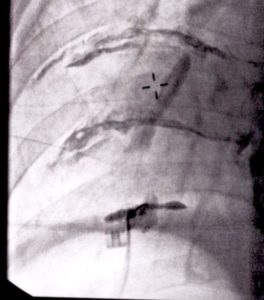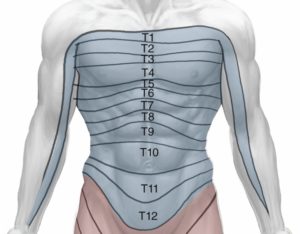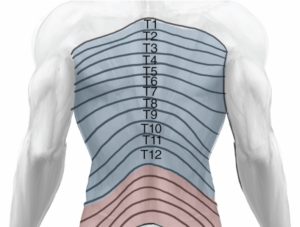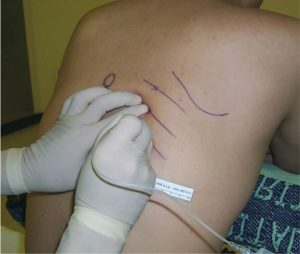Intercostal Nerve Block
Intercostal nerve Block (ICNB)

An intercostal nerve block is an injection of medication that helps relieve pain in the chest area caused by a variety of conditions, collectively known as intercostal neuralgia.
Intercostal nerves are located under each rib. When one of these nerves or the tissue around it gets irritated or inflamed, it can cause pain. A steroid medication and local anesthetic injected under the rib can help reduce the inflammation and alleviate the pain. Intercostal nerve blocks also can be used to help diagnose the source of pain.
Indications
- Diagnose potential source of pain in the chest and abdominal wall
- Rib fractures
- Dislocation of the costochondral joints at the sternum
- Chest pain associated with pleurisy
- Pain associated with herpes zoster
- Pain associated with intracostal nerve entrapment in the abdominis rectus sheath
- Postoperative pain from thoracotomy, sternotomy, and after renal surgery through flank incisions
- Postsurgical pain after chest and upper abdominal surgery such as thoracotomy, thoracostomy, mastectomy, gastrostomy, and cholecystectomy
- Neurolytic ICNB is used to manage chronic pain conditions such as postmastectomy pain (T2) and postthoracotomy pain.
What Are Intercostal Nerves
 The intercostal nerves (ICNs) innervate the major parts of the skin and musculature of the chest and abdominal wall. These nerve carry both sensory and motor fibers, and for the most part, they run underneath and parallel to the rib. They aid in the contraction of intercostal muscles and provide sensory information from the skin and parietal pleura.
The intercostal nerves (ICNs) innervate the major parts of the skin and musculature of the chest and abdominal wall. These nerve carry both sensory and motor fibers, and for the most part, they run underneath and parallel to the rib. They aid in the contraction of intercostal muscles and provide sensory information from the skin and parietal pleura.
ICNs are sandwiched between the parietal pleura (outer layer of the lung) and innermost intercostal muscles (intercostalis intimus) and the external and internal intercostal muscles. The intercostal blood vessels travel along with the intercostal nerves in the intercostal space of each rib.
 As mentioned earlier, pain arising from the intercostal nerves is called intercostal neuralgia. It can occur due to nerve entrapment, traumatic causes, persistent nerve irritation, and herpes zoster. Patients suffering from ICN describe the pain as a shooting, burning, or sharp pain. The location of the pain usually begins in the mid-back and radiates anteriorly into the distribution of the intercostal nerve. The pain is reproducible during deep inspiration or other chest wall movements, which creates a complication for those who do not take adequate breaths.
As mentioned earlier, pain arising from the intercostal nerves is called intercostal neuralgia. It can occur due to nerve entrapment, traumatic causes, persistent nerve irritation, and herpes zoster. Patients suffering from ICN describe the pain as a shooting, burning, or sharp pain. The location of the pain usually begins in the mid-back and radiates anteriorly into the distribution of the intercostal nerve. The pain is reproducible during deep inspiration or other chest wall movements, which creates a complication for those who do not take adequate breaths.
Treatment of ICN can vary from medications like tricyclic antidepressants or anticonvulsants, non-somatic treatment, and also interventional pain treatment. It is important to note that intercostal nerve blocks are a viable option to provide analgesia. This technique should only be done by experienced interventionists given the proximity of these nerves to lungs, and potential complication of pneumothorax.
Procedure
 During the days before surgery, your doctor may recommend to avoid taking drugs that make it hard for blood to clot, such as plavix and warfarin. On the day of surgery, you will probably be told not to eat or drink anything for several hours before the procedure. You can take any medication a doctor approves, along with sips of water.
During the days before surgery, your doctor may recommend to avoid taking drugs that make it hard for blood to clot, such as plavix and warfarin. On the day of surgery, you will probably be told not to eat or drink anything for several hours before the procedure. You can take any medication a doctor approves, along with sips of water.
Your doctor will perform intercostal nerve block in a hospital. You will be offered sedation using monitored anesthesia. The procedure is as follows:
- Patient is positioned in a comfortable position
- Anesthesia is induced by an attending anesthesiologist
- Fluoroscopic images (X-Ray) is used to identify the site of needle entry
- Cannula (needle) is placed under live fluoroscopic guidance under the target rib
- Various safety steps are conducted to confirm accurate location
- Planned medication is injected
- Patient is taken to recovery area
Risks and complications
- Bleeding or bruising at the needle insertion site
- Infection
- Nerve injury
- Lung collapse
Credits & Sources:
- Medscape
- NYSORA


